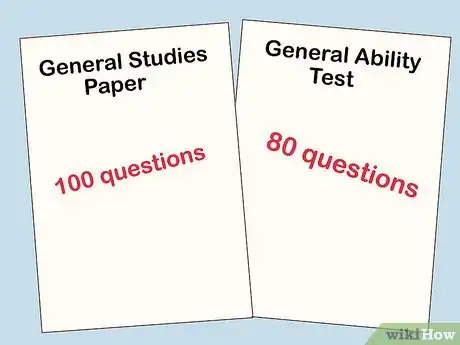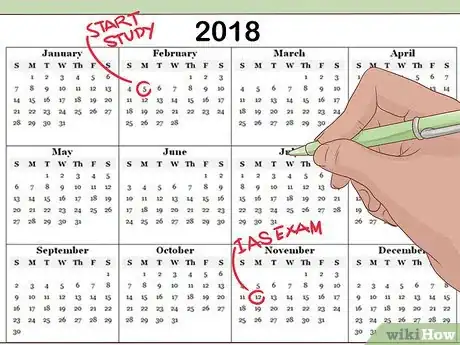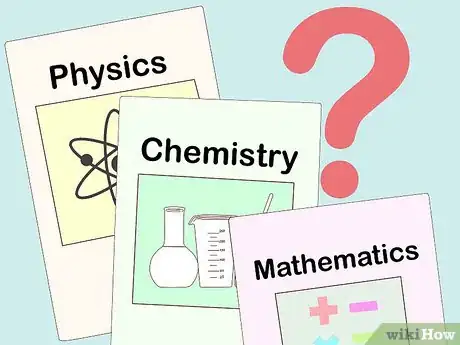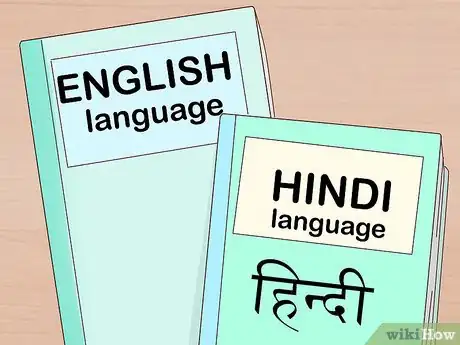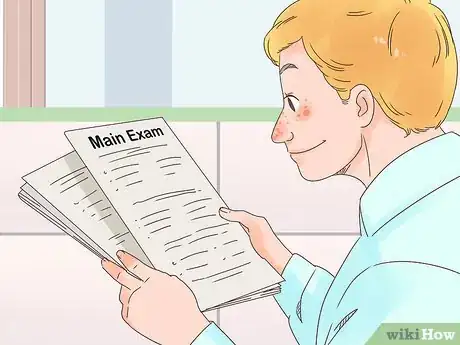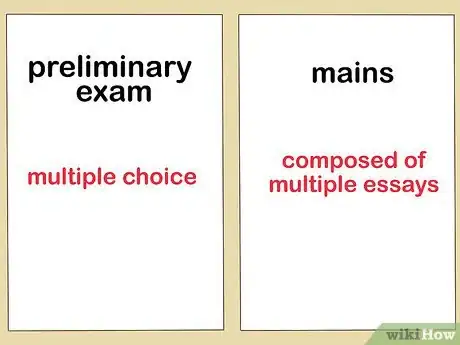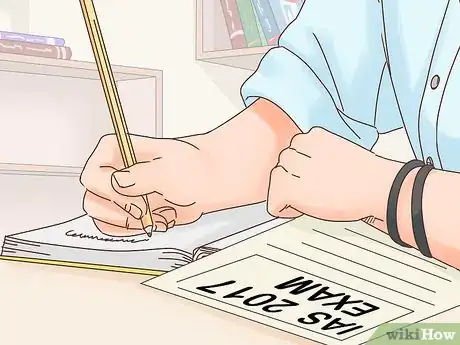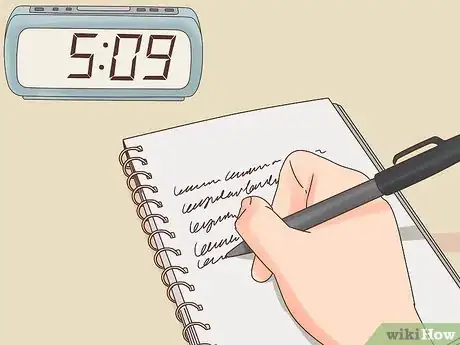wikiHow is a “wiki,” similar to Wikipedia, which means that many of our articles are co-written by multiple authors. To create this article, 41 people, some anonymous, worked to edit and improve it over time.
wikiHow marks an article as reader-approved once it receives enough positive feedback. This article received 37 testimonials and 94% of readers who voted found it helpful, earning it our reader-approved status.
This article has been viewed 381,821 times.
Learn more...
The Indian Administrative Service (IAS) is a branch of the Union Public Service Commission (UPSC). Positions within the IAS provide stature within the community and open pathways to success as a government official. The exam process is highly competitive for and is separated into three distinct parts. Through diligent preparation and knowledge of each portion of the exam, aspirants can increase the probability that they will be successful in serving with the IAS.
Steps
Preparing for the IAS Exam
-
1Become familiar with the syllabus for each exam. Read over the topics on the syllabus for each part of the preliminary exam. The General Studies Paper consists of 100 questions and the General Ability Test contains 80 questions.[1]
-
2Understand the competitive nature of the exam. Each year 5-10 lakh aspirants register and sit for the exam. Less than 1% of the aspirants are chosen for the IAS.Advertisement
-
3Begin your test preparation early. Check the current year’s schedule for the dates of the preliminary exams. Several months of preparation should be done to ensure that you are ready for the variety of questions that may be asked.
-
4Choose an optional subject for which you have passion and familiarity. You will need to become intimately knowledgeable about your optional subject. Begin studying this topic early, and continue to keep up with the information through the end of the mains and interview.
-
5Read the newspaper every day. Stay informed about current events from the local to the international level. Focus on the economic and political sections without worrying about the entertainment news.
-
6Study a variety of subjects. The IAS exams cover a broad range of topics. You need to be well versed in a number of subjects to be successful. Here are a few focus areas included in the Prelims GS (General Studies) Paper:[2]
- Geography: both Indian and World Geography are important areas.
- History: knowledge of key events and social movements is required.
- Polity: the structure of the Indian Constitution, judicial processes, and international relations are all included.
- Economy: micro and macro aspects of the Indian economy should be understood.
- Environmental Science: Climate, agricultural issues, and pollution should be studied in depth.
- Arts and Culture: historical and contemporary study of Indian music, dance, literature, architecture, and painting are all covered during the exam.
-
7Review previous years' exam questions. Read over questions from old tests and familiarize yourself with the types of questions being asked. The content and distribution of questions will change from year to year, but the general format remains largely the same.[3]
-
8Polish your language and communication skills. Although the mains can be taken in a number of languages, preliminary papers are given in Hindi and English. It is important for aspirants to be well studied in Hindi and English.
-
9Read quality books on syllabus (and self-help) as you can find. Because the IAS exam cover so many varied topics, reading books on required subject can be helpful.
- Review book lists from previous toppers.
- Read classic literature.
- Study non-fiction books of various topics such as historical biographies or
-
10Take practice tests. Find practice tests online to prepare yourself for the time limits and formatting of the test. When you take a practice test, try to make the environment like the one you will experience on test day.
- Find a quiet place where you won’t be disturbed.
- Set a timer.
- Take the entire test in one sitting.
- Review the answers when you are finished to learn from your mistakes.
Getting Ready for the Mains Exam
-
1Read the syllabus for each of the papers in the mains exam. There are 9 essay papers required in the mains exam. Become familiar with the topic and language requirements for each essay.
-
2Understand how the Mains differ from the Preliminary Exams. While the preliminary exam was multiple choice, the mains are composed of multiple essays. Applying the knowledge you gained studying for the preliminary exam will be important composing your essays.
-
3Go over papers and essays written by previous year’s toppers. It is good to review what worked well in previous years to get an understanding for the type of writing and formatting used. Read several papers by different people to get a broad picture of what was successful.
-
4Study current events and happenings in detail. Continue reading the newspaper daily. Follow local, national, and international events online to stay current on what is happening around the world.
-
5Practice writing answers to last year's questions. Your writing style is just as important as the information you are writing about. Make sure that you practice composing, formatting, and editing your writing to be ready on exam day.
-
6Practice with a timer. Prepare yourself to write your essay in the limit of 3 hours per paper. Plan a strategy to format your essay:
- Brainstorming
- Creating an outline
- Writing a rough draft
- Editing
- Writing a final copy
-
7Ask family and friends to edit and review your responses. Seek out critical feedback on your writing. Review what you have written and compare your original responses against the feedback to incorporate the suggestions of others into your future practice.
-
8Review material in your optional subject in detail. Two of the mains exam papers will focus on your optional subject. Make sure that you are fully prepared by studying this informations of in depth.
Interviewing with the Board
-
1Practice with mock interviews. Prepare yourself to appear before the board by practicing answering questions with confidence and professionalism.
- Watch online videos of mock interviews.
- Practice answering questions in the mirror.
- Ask family and friends to interview you as practice.
-
2Dress in a professional manner for your interview. Your appearance is important when you appear before the committee. Be sure that your clothes are clean and fit properly to put forward your best impression during the interview.
-
3Make eye contact with the board member who is addressing you. Listen actively and make sure that you are attentive to the questions you are being asked.
-
4Be confident during your interview. The board members may try to make you uncomfortable with difficult questions. Stay calm and answer the questions as directly as possible.[4]
-
5Answer questions honestly and directly. Be prepared to answer questions on any subject. Using the question in your answer shows the board that you are listening attentively and formulating detailed responses. Be honest and open with the interview board to show your best attributes.
Community Q&A
-
QuestionHow can I prepare for this career after 12th grade?
 Community AnswerStart from NCERTs and read The Hindu newpaper to develop your vocabulary. Stay connected with current affairs.
Community AnswerStart from NCERTs and read The Hindu newpaper to develop your vocabulary. Stay connected with current affairs. -
QuestionCan I pass the IAS exam if I am only an average student?
 Community AnswerIf you study hard, you may be able to pass the exam.
Community AnswerIf you study hard, you may be able to pass the exam. -
QuestionWhich subject is best for an IAS exam?
 Community AnswerSocial science, including geography, economics, history and most importantly political and other scientific information about india, like weather, agriculture etc
Community AnswerSocial science, including geography, economics, history and most importantly political and other scientific information about india, like weather, agriculture etc
Warnings
- Be wary of test preparation centers that ‘’guarantee’’ results. Some test prep centers are just out to make money and haven’t produced any toppers. Research the test prep center before you pay any money.⧼thumbs_response⧽
References
- ↑ http://www.civilserviceindia.com/subject/preliminary-syllabus.html
- ↑ http://www.jagranjosh.com/articles/on-what-issues-should-i-focus-for-the-ias-preparation-1441630658-1
- ↑ http://www.upscsyllabus.in/cse/csat-syllabus
- ↑ http://www.competition.careers360.com/articles/upsc-civil-services-interview-experience-air-6-sakshi-sawhney
About This Article
To prepare for the Indian Administrative Service, or the IAS, exam in India, you’ll need to become familiar with the syllabus for the General Studies Paper and the General Ability Test. You’ll also need to choose an optional subject that you feel passionate about or familiar with. Since the exams cover a broad range of topics, like geography, history, economics, and culture, one way to prepare is to read the newspaper daily and always have a book that you’re working on. You’ll also want to review the exams from previous years and take practice tests online. To learn how to polish your language skills for the exams, keep reading!
